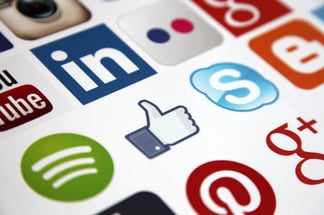Social Media in Healthcare: 4 mistakes to avoid that could damage your practice
By: Nextech | October 29th, 2015


These days it seems like we are all living in a world ruled by social media, where constantly sharing every little detail of their lives has become the new normal for many people—Facebook status updates, Tweets, Instagram photos and videos of kids, pets, food… you name it. As a result, the use of social media marketing has become a necessity for today’s businesses, both large and small. And healthcare practices are no exception.
According to a survey conducted by MediaBistro, over 40% of healthcare consumers stated that information found on social media affected their health decisions. It also found that people ages 18-24 were over two times as likely to use social media for healthcare-related discussions as those in the 45-54 age bracket. Overall, 41% of those surveyed stated that input from social media would influence their choice of a specific doctor, hospital, or medical facility.
If your practice is not already using social media, then I would say that yesterday would probably be a very good time to start doing that. Trust me, it’s not going away anytime soon so you might as well get with the program. Social media is a relatively easy and extremely cost effective way to promote your practice, after all… if used correctly.
When it comes to social media marketing, however, knowing what not to do is sometimes more important. Careless mistakes and/or thoughtless sharing done on sites such as Facebook and Twitter have been responsible for the professional downfall of so many people in recent years—from politicians to celebrities to healthcare professionals.
So in this blog post we are going to take a look at four common (and potentially brand/reputation destroying) mistakes that you should always avoid when using social media to promote your medical practice.
1. Hashtag Fails
While hashtags (#) can be useful, allowing your posts to be more easily located by those interested in them, using them incorrectly can actually do more harm than good.
- Hashtag Hijacking: this is when you use/steal a hashtag simply because it is popular/trending, without really thinking about the meaning or relevance of it. This is a very bad idea. Just ask the folks over at DiGiorno Pizza, who jokingly used the hashtag #WhyIStayed last year. Only one problem… that hashtag was meant to be used by survivors/victims of domestic violence. The situation quickly turned into a public relations nightmare for them.
- Spam Hashtagging: Try to avoid using more than 3-4 strong hashtags in a single post, instead of as many as you can make fit. No one wants to read a post that looks like this—Come #visit our #practice! #Physician #Healthcare #BestDoctors #GoodDeal #QualityHealthcare #BringTheFamily #GreatDoctor
- Not Properly Combining Words: Hashtags work by phrase, not by individual words. This seems to confuse some people. For example, using fragmented hashtags like this—#Best #Surgeon #InTampa—makes no sense because no one is going to search “#InTampa” or “#Best” when looking for a surgeon. Try using #BestSurgeonInTampa instead, combining everything into a single hashtag topic and making your post much easier to find.
2. Posting Controversial, Political, or Overly Personal Opinions
While it’s a good idea to be personable and friendly in your posts, you should avoid letting them get too personal. That stuff is fine for a personal profile, but it doesn’t belong on your professional page. Seriously… take a look at what happened to Amy's Baking Company. Avoid any of the following:
- Posts with negative comments about a political figure or celebrity
- Posts that endorse or denounce political opinions or groups
- Opinions regarding controversial topics (immigration, religion, gun control, etc.)
3. Not Responding to Follower Comments
When people take the time to comment on your practice’s social media page, they tend to expect some form of reply. Even just a simple “Thank you for your comment” is often enough. However, not responding makes commenters feel ignored or that your practice doesn’t consider them important. This is especially true if someone posts negative comments or feedback. You should never ignore or delete negative comments (unless they are offensive, vulgar, or otherwise inappropriate), but instead take care to address them openly. For tips on dealing with negative comments, see my past blog article on this topic.
4. Posting Too Much/Not Enough
Posting something every hour will cause followers to view your social media as a “spam page,” and they may unfollow if they feel your posts are always flooding their feeds. On the other hand, no one wants to follow a page that rarely if ever posts anything. Therefore, it’s important to have a consistent but appropriate posting frequency. Below are some general posting frequency guidelines for some of the most common social media outlets:
- Twitter: 2 to 12 posts per day (most viewed posting time is from 1am to 11pm EST)
- Facebook: 2 to 4 posts per day (most productive times for posts are 11am and 4pm EST)
- LinkedIn: 1 to 3 posts per day (most productive time is between 9:15-9:30am EST)
- Google+: 2 to 3 posts per day (most productive times for posts are 10am and 8pm EST)
So there you have it, folks. By avoiding the above mentioned mistakes, you will be able to make sure your practice doesn’t suffer a damaging social media faux pas. Now get out there and use those social media tools to win the internet (I know that social media can be a bit scary, at times… but you can do this).
HERE ARE SOME RELATED ARTICLES YOU MAY FIND INTERESTING
Practice Management | Patient Engagement | Patient Care
A Practice Owner’s Guide to Navigating Difficult Patient Encounters
By: Nextech | January 12th, 2026
Practice Management | Patient Engagement | EHR | Referrals
A Playbook for Increasing Referrals at Your Specialty Practice
By: Nextech | December 22nd, 2025